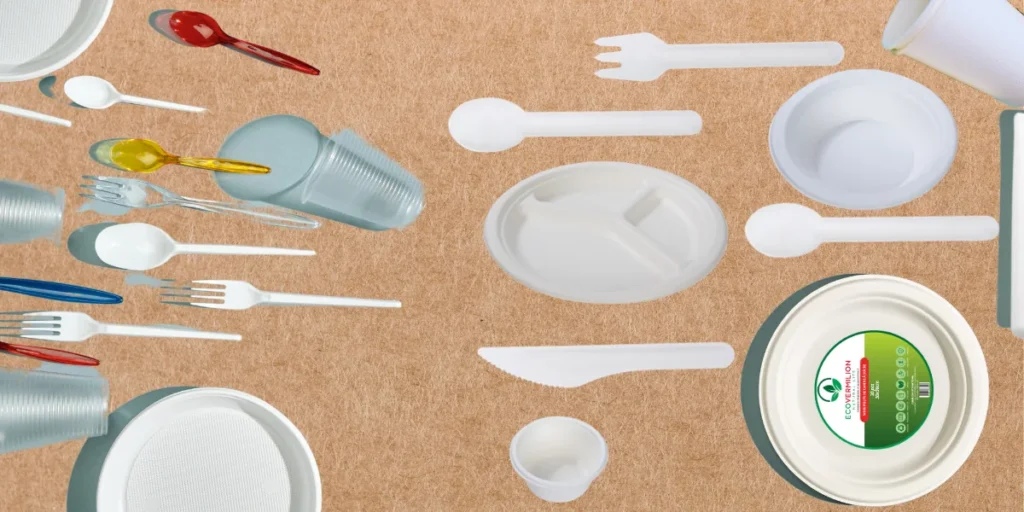Can You Host Large Gatherings Without the Stress?
Can You Host Large Gatherings Without the Stress? Can You Host Large Gatherings Without the Stress? Believe it or not, you can set the table for large gatherings without the usual stress. Whether it’s a wedding, an engagement, or a big party, what could be more enjoyable than having your loved ones around? However, the behind-the-scenes work of preparing food, setting the table, and dealing with piles of dishes can quickly turn joy into stress. But what if there was a stress-free, eco-friendly solution? Enter tableware made from sugarcane fiber—a stylish, healthy, and environmentally conscious alternative to conventional disposable dishes. Let’s uncover why these plates are the perfect choice for unforgettable events and a green future. Effortless Gatherings: Sustainable Tableware Options Made from bagasse, the fibrous byproduct of sugarcane juice extraction, sugarcane fiber tableware is changing our perception of disposable items. These plates offer a convenient solution for busy hosts and meet the growing need for sustainable options. Why Opt for Sugarcane Plates? Health-Conscious: Free of harmful substances like BPA, making them safe for both hot and cold foods. Convenient: Designed for single use, these plates eliminate the hassle of washing, saving time and effort. Eco-Friendly: Completely compostable, breaking down naturally without leaving harmful residues. Stylish and Adaptable: Their sleek design is suitable for both formal occasions and casual get-togethers. Choosing sugarcane plates not only streamlines your event planning but also makes a positive statement for the planet. Ideal for Any Event Weddings and Engagements For significant events like weddings and engagements, sugarcane plates are the perfect pick. They provide a clean, elegant presentation while freeing hosts from post-event cleanup. Guests will admire the sophisticated look, and you’ll enjoy the practicality. Parties and Festivities Whether it’s a birthday or an anniversary, sugarcane plates are your go-to for quick setups and cleanups. They bring elegance to the table while supporting a more sustainable world, allowing you to focus on enjoying the celebration rather than worrying about the mess. Large Family Gatherings Having a big dinner at home? Sugarcane tableware is a lifesaver for managing extensive guest lists. These plates are not only cost-effective but also sturdy enough to handle everything from starters to desserts. Balancing Convenience with Sustainability While single-use products often carry a stigma of wastefulness, they are sometimes necessary for convenience and hygiene. Sugarcane plates offer an eco-friendly alternative to traditional plastic disposables. Here’s what makes them special: Reducing Plastic Waste: Unlike plastic plates that take ages to decompose, sugarcane plates break down in just weeks under composting conditions. Lowering Carbon Footprint: Made from agricultural byproducts, they require less energy and fewer resources than plastic production. Supporting a Circular Economy: By using bagasse, these plates turn waste into a valuable resource, closing the loop in production cycles. Opting for these plates contributes to a cleaner environment and sets a precedent for mindful consumption. A Host’s Best Companion Time-Efficient Convenience Events can be demanding, especially with multiple tasks at hand. Sugarcane plates make cleanup easy, allowing you to focus on important moments. Instead of hours spent washing dishes, you can enjoy time with your guests. Chic and Sophisticated These plates don’t just function well—they look great too. Their minimalist design complements any table setting, adding a touch of elegance to your events. Whether it’s a rustic outdoor wedding or a chic indoor gathering, sugarcane plates fit seamlessly into the decor. Versatility at Its Core Durable and heat-resistant, sugarcane plates are perfect for all types of dishes. Whether serving hot soups or cold salads, they maintain quality and safety. The Environmental Benefits Choosing sugarcane tableware is about more than convenience—it’s about positively impacting the environment: Biodegradability: These plates decompose naturally, enriching the soil rather than polluting it. Sustainable Sourcing: By utilizing agricultural waste, sugarcane plates help reduce the pressure on natural resources. Reduced Carbon Emissions: Their production process emits significantly fewer greenhouse gases compared to plastic. Every plate you use sends a message: you care about the planet and are dedicated to sustainable choices. Suggestions for Eco-Friendly Event Planning Looking to make your events even more eco-friendly? Consider these tips: Choose Compostable Decorations: Opt for decor made from natural materials like flowers, leaves, or recycled paper. Promote Waste Sorting: Provide bins for compostable, recyclable, and non-recyclable items to ensure proper waste management. Minimize Food Waste: Plan portions carefully and donate leftovers to local shelters or food banks. Support Local Suppliers: Choose businesses that prioritize sustainability and reduce transportation emissions by sourcing locally. Reuse When Possible: While disposables have their advantages, incorporate reusable items like glassware or metal utensils where feasible. By implementing these practices, you can create events that are both memorable and environmentally responsible. What Are Your Thoughts? Have you used sugarcane tableware at your events? How did it change your hosting experience? We’d love to hear your thoughts and ideas. Share your experiences in the comments and join the discussion on how we can all contribute to a more sustainable future. Together, let’s make every celebration a step toward a greener world! Categories Blog Sustainable Teller Uncategorized Uncategorized Uncategorized Blog Uncategorized Uncategorized Uncategorized Blog Uncategorized Blog Sustainable Uncategorized Older Posts Tags Blog Sustainable Teller Uncategorized Uncategorized Eco-Friendly Sustainable Older Posts
Can You Host Large Gatherings Without the Stress? Read More »






